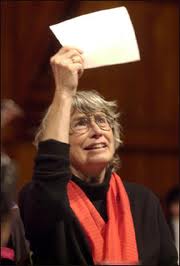
19 Nov Poet of the World We Didn’t Make: Mary Oliver
I have grown to be of the mind that human beings are in greater danger of extinction than nature. And I haven’t figured out yet whether or not this would necessarily be a bad thing. As David Whyte has pointed out, “human beings are the only ones in creation who are in exile.” We are encouraged to forge our sense of belonging from the beginning of our so-called “education.” The right memberships and alliances are critical to our worldly success. Some of us belong to podiums and institutions, to political forums and such. But deep down, all of us know that all crafted associations are diversions, aren’t they? How we love our distractions that give us a sense of shining purpose . . . Meanwhile, Nature rolls on. The waters will freeze, melt, then freeze again. The earth will burn to ash and out of that ash new life will emerge. But will we?
Nature is our teacher and forever will be. Nature will remain our teacher regardless of whether we earn the right to live here in this kingdom of opportunity or lose it. We are the fragile ones, lost in the desert and at sea. What will we do with this privilege? Will we learn that time is only an idea and eternity is more than a possibility? In fact, what is eternal might just be right before our eyes, hidden within the call of the geese that fly northward and concealed under the snows that silently cover the world with their blankets of peace.
________
Mary Oliver (born September 10, 1935) is an American poet who has won the National Book Award and the Pulitzer Prize. The New York Times described her as “far and away, this country’s [America’s] best-selling poet”.
Oliver has also been compared to Emily Dickinson, with whom she shares an affinity for solitude and interior monologues. Her poetry combines dark introspection with joyous release. Although she has been criticized for writing poetry that assumes a dangerously close relationship of women with nature, she finds the self is only strengthened through an immersion with nature. Oliver is also known for her unadorned language and accessible themes. The Harvard Review describes her work as an antidote to “inattention and the baroque conventions of our social and professional lives. She is a poet of wisdom and generosity whose vision allows us to look intimately at a world not of our making.
When Death Comes by Mary Olivor
When death comes
like the hungry bear in autumn;
when death comes and takes all the bright coins from his purse
to buy me, and snaps the purse shut;
when death comes
like the measle-pox
when death comes
like an iceberg between the shoulder blades,
I want to step through the door full of curiosity, wondering:
what is it going to be like, that cottage of darkness?
And therefore I look upon everything
as a brotherhood and a sisterhood,
and I look upon time as no more than an idea,
and I consider eternity as another possibility,
and I think of each life as a flower, as common
as a field daisy, and as singular,
and each name a comfortable music in the mouth,
tending, as all music does, toward silence,
and each body a lion of courage, and something
precious to the earth.
When it’s over, I want to say all my life
I was a bride married to amazement.
I was the bridegroom, taking the world into my arms.
When it’s over, I don’t want to wonder
if I have made of my life something particular, and real.
I don’t want to find myself sighing and frightened,
or full of argument.
I don’t want to end up simply having visited this world.
________
Wild Geese by Mary Oliver
You do not have to be good.
You do not have to walk on your knees
for a hundred miles through the desert repenting.
You only have to let the soft animal of your body
love what it loves.
Tell me about despair, yours, and I will tell you mine.
Meanwhile the world goes on.
Meanwhile the sun and the clear pebbles of the rain
are moving across the landscapes,
over the prairies and the deep trees,
the mountains and the rivers.
Meanwhile the wild geese, high in the clean blue air,
are heading home again.
Whoever you are, no matter how lonely,
the world offers itself to your imagination,
calls to you like the wild geese, harsh and exciting —
over and over announcing your place
in the family of things.
https://youtu.be/XnaP7ig69go



Rita Sotomayor
Posted at 06:01h, 20 NovemberInteresting that Wild Geese is one of her poems frequently quoted/read by Richard Rhor. I love its simplicity and its depth, all at once.
Marianne Geyer
Posted at 19:06h, 20 NovemberWonderful poetry! Thank you Neale.